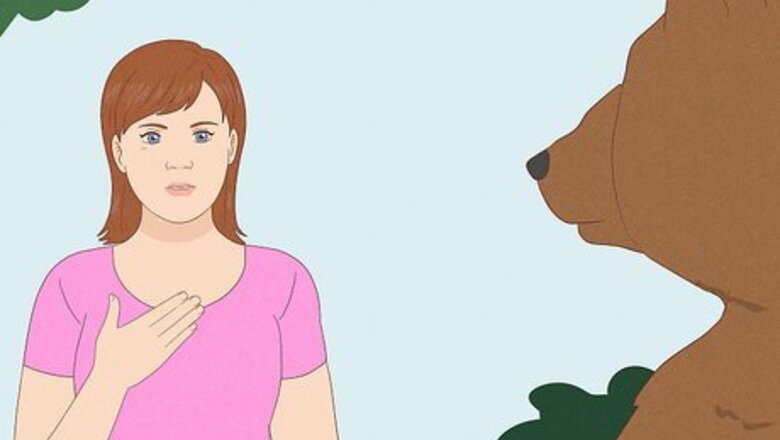
views
- Make lots of noise, make yourself appear as big as possible, and stand your ground if you encounter a bear.
- Bring bear spray when you go camping or hiking. Spray any bears that approach you to send them fleeing.
- If you don't have bear spray, play dead if you encounter a grizzly bear or brown bear. Fight back against attacking black bears.
- Rest assured, bear attacks are extremely rare. Most bears actively avoid human beings.
Stay calm.
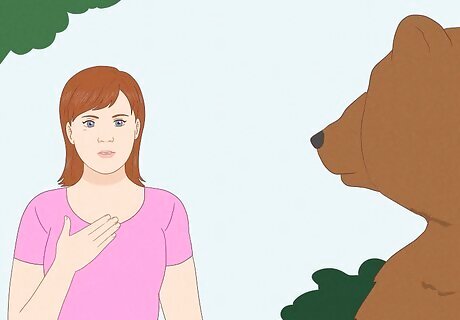
Keep your cool and remember the bear is unlikely to attack. Most bears actively avoid humans. If you’ve encountered a bear, there are two potential reasons: it stumbled on you by accident, or it doesn’t realize it’s tracking a human. In either case, just take a deep breath and steady your nerves. Take a moment to scan the environment and get your bearings. It is extremely rare for bears to track a human. It may think you’re a deer or something like that, or it smells food you’re carrying. Once it realizes you aren’t prey, it won’t attack. If you stumbled on the bear by accident, it may be as surprised as you are. Don’t jump or dart away, though. That will only excite the bear further.
Fight the urge to run.
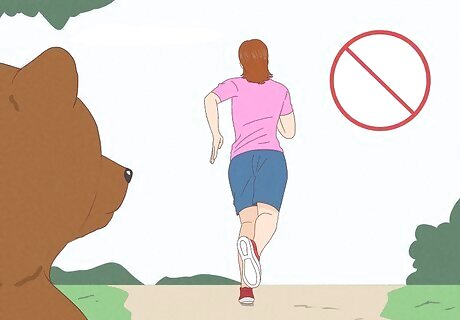
If you make a run for it, the bear’s instinct will be to chase you. Once the bear leaves, you can back away slowly in the opposite direction. If you take off in the opposite direction though, the bear’s natural desire to hunt for food may kick in and lead them to take off after you. Stand tall, don’t turn your back, and fight the urge to flee. Most bears can run over 30 miles per hour (48 km/h). For context, most people can run 6–8 miles per hour (9.7–12.9 km/h). In other words, you’ll never outrun a bear. Every bear can (and will) follow you up a tree if you climb one. As bulky and heavy as bears are, they’re actually phenomenal climbers, and can climb a tree at 6–8 miles per hour (9.7–12.9 km/h). You may have heard that bears can’t run downhill. This is a popular myth, but there’s no truth to it. Jumping into water is not helpful, as bears can swim 4–5 miles per hour (6.4–8.0 km/h), which is considerably faster than humans.
Talk to the bear.
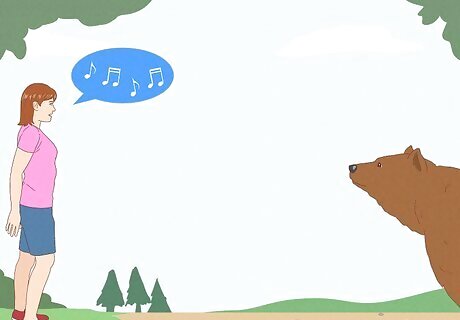
Sing, shout, or start chatting away to show them you’re human. A bear’s normal prey isn’t going to make human noises, so “speaking human” will signal that you aren’t food. In fact, your voice should send the bear running scared. Bears do not have any desire to be around people, so this may be all you need to do to get back to being bear-free. If you happen to be holding something noisy, like a pot, bang it repeatedly while you talk, sing, or shout.
Make yourself look bigger than you are.
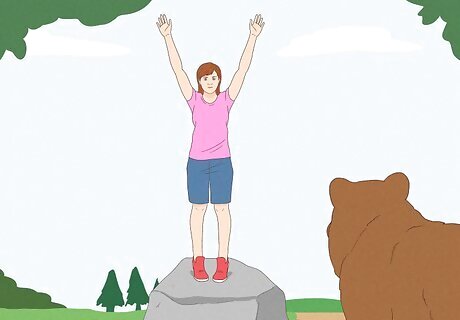
The bigger you look, the more likely the bear will be too scared to attack. The bear doesn’t know what you are or what you’re doing, but the bigger you can appear, the more intimidating you’ll be. Put your arms up and get on your tippy-toes. If you’re next to a small hill or stack of rocks, slowly walk to position yourself on top of it to appear bigger. If you’re wearing a jacket, pull the bottom corners up over your head and wave it back and forth. At this point, the vast majority of bears should be scared off and begin moving away.
Pick up small children.
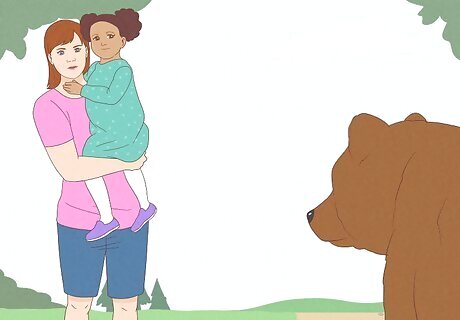
The bear may think kids are prey, so get them off the ground. This also has the added benefit of making you look larger and confusing the bear, which only further contributes to the bear understanding you aren’t edible. If you don’t pick any kids up, the child may dart away and cause the bear to pounce. Continue talking and making noise while you pick any children up. If you have a super young child who doesn’t realize what’s going on, sing a children’s song. Maybe they’ll help you scare the bear by singing along.
Stand your ground if the bear charges at you.
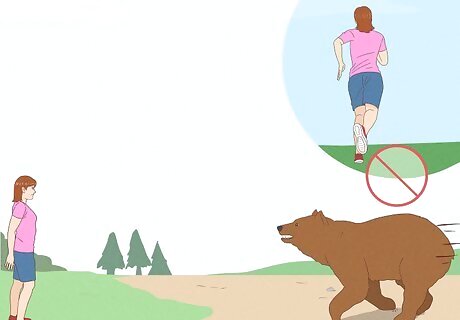
Bears may sprint at you momentarily to see if you’ll run, but don’t react. When bears are spooked, they will often bluff an attack by charging at the target for a moment or two to see how they’ll react. If the bear is far off and it charges towards you and then stops, just stand tall and keep doing what you’re doing. The test charge is an indicator what you’re doing is working. A black bear may stomp their feet or growl loudly instead of charging. If you see a bear stand up, it’s not a sign that they’re going to attack. Bears just do this when they’re trying to sniff the air to orient themselves.
Use your bear spray if you have it.
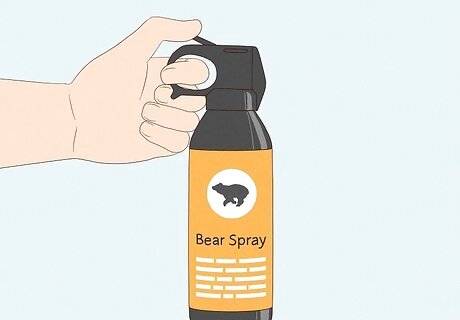
If the bear moves towards you, spray it to send it fleeing away. If the bear gets within 60 feet (18 m), remove the safety clip on your bear spray, aim the nozzle slightly below the bear’s face (bear spray billows upwards), and spray the bear. Continue spraying until they flee. This is the most effective way to survive if a bear attacks. Once the bear flees, leave the area immediately by travelling in the opposite direction—preferably the way you came. You should always bring bear spray with you when you go hiking or camping. Purchase bear spray at any outdoor store, national park gift shop, or online. When you’re outdoors, always keep the bear spray close to you in an easily accessible area. Many hikers keep the spray clipped on to their backpack straps.
Move away slowly if the bear doesn’t leave.
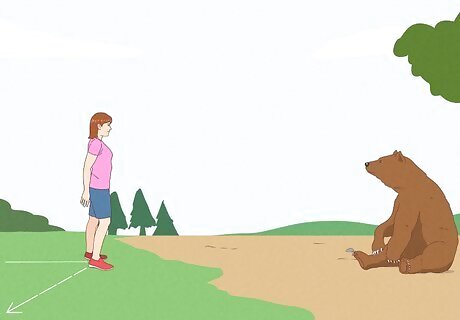
If they just sit there staring, shuffle away extremely slowly. If you’re dealing with a bear who isn’t intimidated by your antics but also isn’t approaching, it may just keep looking at you (or go about its normal business). If this happens, move sideways at a slight angle (to avoid tripping) as you backpedal away from the bear. Slowly get out of eyesight and then carefully and quickly get out of the area. Moving at an angle also won’t accidentally give the bear the impression that you’re running away, which will trigger a chase.
Play dead if you’re attacked by a brown/grizzly bear.
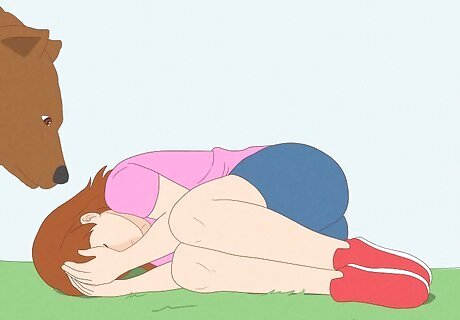
Lie down in the fetal position to prove you won’t hurt them. Brown and grizzly bears tend to only attack if they feel threatened or they’re surprised. If one of these bears approach you and you’re unlucky enough to not have bear spray on you, lie down, tuck your knees to your chest, and cover your head. The bear is likely going to wander off once they realize you aren’t going to hurt them. If you do have bear spray, continue to spray the bear as it gets close and aim for the eyes. That’s always going to be a better option than playing dead. Do not get up right away—wait 2-3 minutes until you no longer hear the bear. The bear is likely to hang out for a minute to confirm that you’re not going to get up and attack. Remember the phrase, “If it’s brown, lie down.”
Fight back if you’re attacked by a black bear.
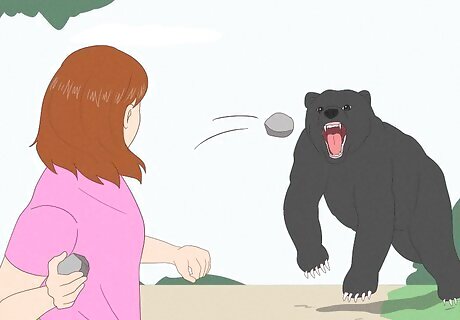
Black bears won’t give up if you play dead, so don’t even bother. If you don’t have bear spray and a black bear starts charging at you, throw rocks at it, toss your belongings at it, and shout. If they get even closer, hit them in the eyes or nose, and do your best to shock or stun the bear to send them fleeing. Playing dead just won’t trick a black bear into leaving you alone, so there’s no point. If you do have bear spray, use that instead of trying to physically fight the bear. Black bears are like bullies. They’ll often give up if you show them you’re willing to fight back. You can remember to fight black bears with the motto, “If it’s black, fight back.”


















Comments
0 comment